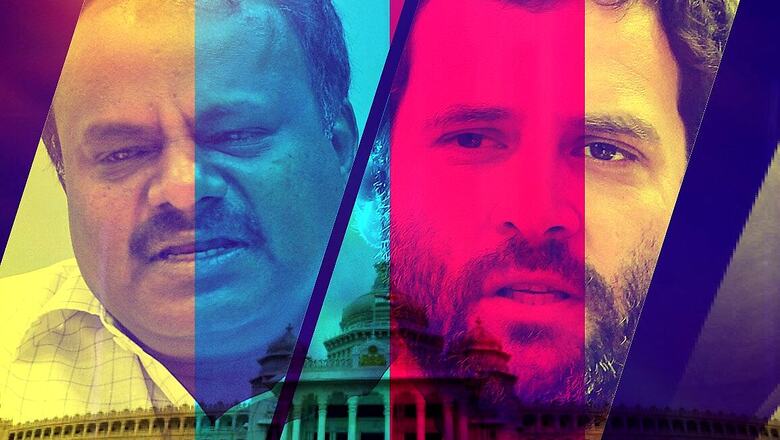
views
The Humble Farmer fulfilled his vow to humble the “mean, immoral politician” he had once nurtured in the Janata Dal. Having put Siddaramaiah out to pasture, former prime minister H D Deve Gowda's next step would be to checkmate the man he once publicly dubbed as a “b___” - BS Yeddyurappa - the BJP chief ministerial candidate, who is near and yet so far from a simple majority.
The sweetness of the BJP's triumph in Karnataka has been diluted by a small shortfall in numbers, thereby affording the Congress-backed Janata Dal(S) an opportunity to stake its claim. Regardless, the party's seventh consecutive electoral success (not counting the presidential election) will doubtless underscore the storied invincibility of the Modi-Shah duo and give them added traction in the general elections.
Karnataka Governor Vajubhai Vala's scope for action is limited. He can invite the BJP and give it time to prove a majority. Or he can accept the JD(S)' claim, which is loosely based on the “Goa” model – that is, a post-electoral coalition which outnumbers the single largest party. In this case, the gap between the winner (BJP) and runner-up (Congress) is so wide, however, that he must exercise his discretion carefully, with the objective of ensuring a stable government.
So imperative is the Congress' need to retain some kind of lien on Karnataka that the party, like Abraham sacrificing Isaac, was ready to offer up Siddaramaiah at the altar of political expediency even before counting. Deve Gowda played hardball because he knew he could. He can now stand tall in a coalition of regional forces, whereas the Congress is at a disadvantage vis-a-vis the Federal Front.
Just when analysts thought the Congress was at rock bottom, with no place to go but up, it drilled even deeper. As a result, the party will find it difficult to stake a claim to lead a coalition of opposition parties in the general elections.
In positioning Karnataka as a pivotal battle, the Congress set itself up to lose its right to the pole position in an anti-BJP front. Nor can it assume that it will recoup its losses in Rajasthan, Madhya Pradesh and Chhattisgarh, as the possibility of a general election in December, 2018, is very real.
Pilloried for having failed to explore a pre-electoral alliance with the Janata Dal (S), with West Bengal chief minister Mamata Bannerjee tweeting an “I told you so” earlier in the day, the Congress had no option but to kowtow to Deve Gowda.
Beggared without a chief minister in Karnataka, the Congress no longer has the luxury of choosing its allies. The boot is on the other foot. Its only hope is that the relentless march of the BJP will force the non-NDA opposition (like the SP and BSP) to coalesce and offer the Congress reasonable terms.
The most worrying aspect is that the loss was not through a lack of effort, overconfidence or arrogance. Congress president Rahul Gandhi campaigned relentlessly and gave Siddaramaiah a free hand. He couldn't have done any more than he did. But nothing in the Congress arsenal could counter the BJP, particularly in the absence of any overt communal polarisation. Not to mention the fact that, at the outset, the odds were heavily stacked against the BJP.
The obvious popularity of the Prime Minister, whose 21 high-voltage rallies turned the campaign around, made it clear that in a “Modi vs Rahul” battle, the latter stands to lose. The party may have done better in a straight 'Siddu' versus 'Yeddy' contest.
Party president Rahul Gandhi will have to think outside the box, for the first time in his political career. Getting out of the hole in which the party finds itself post-Karnataka, will demand both Herculean vigour and Hanuman-esque humility.
To be fair, the BJP was helped along by the Congress missteps and the Janata Dal (S) upswing. A high voter turnout and a three-cornered contest helped immensely in the 80-plus seats where the margin of victory in 2013 was narrow. Shah focused his efforts on these seats.
Siddaramaiah was on a favourable pitch; how did he mess it up? Everything seemed to going well, from the Feburary 16 Cauvery case judgment, giving 5 per cent more water to hydrologically-challenged Karnataka, to the BJP's self-goals. Yeddyuruppa was hardly a unanimous choice for CM and allocation of tickets to the Bellary khandaan nullified the anti-corruption plank.
Did Siddaramaiah's divisive politics and pandering to Kannada pride prove counterproductive? Certainly, his social engineering gambit, to win over the Lingayats by according them minority status, did not have the desired results and annoyed the Vokkaligas. He had had hoped to more than make up for it with OBCs, minorities, tribals and the 'right hand' dalits, through his free rice scheme.
But he simply could not overcome agrarian angst and the Bengaluru meltdown. Flawed ticket distribution didn't help matters and Karnataka's three-decade old pattern of anti-incumbency was repeated.
As for the BJP, with a general election coming up, it must consider the well-known fact that Karnataka historically votes against the national trend. It won Karnataka in 2008, only to lose the Lok Sabha in 2009. Five years later, it was vice-versa. Perhaps the Modi magic will prove strong enough to break the pattern.
(The writer is a senior journalist. Views are personal)
















Comments
0 comment